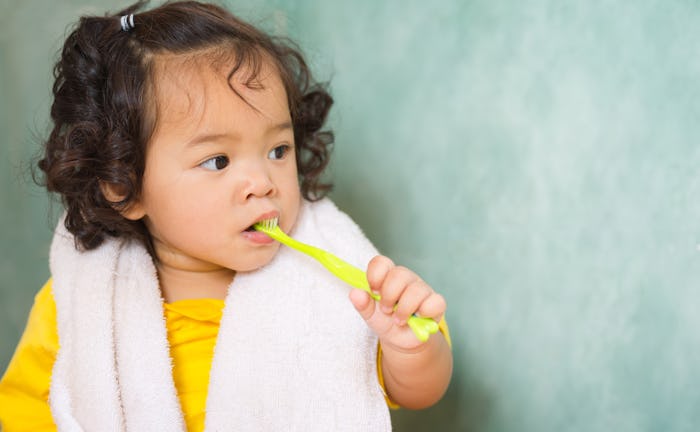Life

How Do You Know It's Time To Use Toothpaste? Hint: Peek In Their Mouth
Tooth care is something that's drilled into us at an early age. Brush! Floss! Don't eat sticky sweets! And if you don't take good care, you get the ultimate punishment — cavities, or holes in your teeth that now require a Novocaine shot and a drill. My teeth hurt just thinking about it and I certainly want to avoid that fate with my kids. So when should a toddler start using toothpaste to guarantee (as much as you can guarantee these things) tip-top tooth strength?
If you want your kids to have a jumpstart on dental health, start using toothpaste fortified with fluoride as soon as you see little teeth erupt from their gums, according to the American Dental Association (ADA). Before their teeth even come in, the American Academy of Pediatric Dentists (AAPD) recommends you wipe their gums with a washcloth and water every day. Once the teeth start poking through, the AAPD says you can take a "tiny smear of fluoride toothpaste to brush baby teeth twice daily... and a soft, age-appropriate sized toothbrush." The folks at BabyFrida have created one they call the "Toothhugger" which features a triple-angle design that literally hugs the teeth for optimal cleaning. Toothhugger ($10, BabyFrida)
Moms of older kids may tell you not to use fluoride toothpaste on kids younger than 2, but the ADA changed its recommendations. They were seeing too many kids arrive in kindergarten with cavities and felt they needed to do more to prevent this. "For half a century, the ADA has recommended that patients use fluoride toothpaste to prevent cavities, and a review of scientific research shows that this holds true for all ages," Edmond L. Truelove, D.D.S., chair of the ADA Council on Scientific Affairs said in a 2014 news release. "Approximately 25 percent of children have or had cavities before entering kindergarten, so it’s important to provide guidance to caregivers on the appropriate use of fluoride toothpaste to help prevent their children from developing cavities."
Because ingesting too much fluoride can lead to dental fluorosis and white spots on your child's teeth, you need to really hover over them and make sure they are rinsing with water and spitting out the toothpaste when they brush. If you use a swipe of toothpaste when they are babies, shoot for a pea-sized amount once they turn 3, as Baby Center recommended. By this time they will be much better at the rinsing and not swallowing part. It's still probably a good idea to supervise them and make sure they do it right and for long enough.
Some kids will give you a hard time about brushing and they'll fight like crazy or come up with some really creative excuses to get out of it. Don't let them! Of course, it shouldn't come to the point where you have to hold them down, but don't be afraid to use sticker charts to reward reluctant brushers. Find a song that runs about two minutes and let them hum it in their head or play it for them as they brush. This will help the kids who might try to brush and dash and get away with less than optimal brushing.
Making them feel empowered is also a great way to have them buy in. Take them with you to the store and let them select their own toothbrush and toothpaste. This is the time when those silly cartoon characters on the toothpaste will come in handy. Most adult toothpastes are mint, but the kids might not find that as refreshing as adults do. Look for more kid-friendly flavors like strawberry, bubblegum, berry blast, and fruity fun. Be careful though — we then go back to the risk that the kids think toothpaste is candy and want to swallow it.
Dr. Mark Burhenne, a family and sleep medicine dentist who created the blog "Ask the Dentist" suggests you keep teeth brushing positive and make it a family affair. Like anything, if you model good behavior (and Dr. Burhenne says that includes even brushing on the beach or in the car), the kids are more likely to follow you.
As soon as you see those pearly whites peeking through the gums, grab your fluoride toothpaste and start your kiddie off on a lifelong habit of brushing and good dental hygiene. And then pump the tunes and make it fun for them to brush.